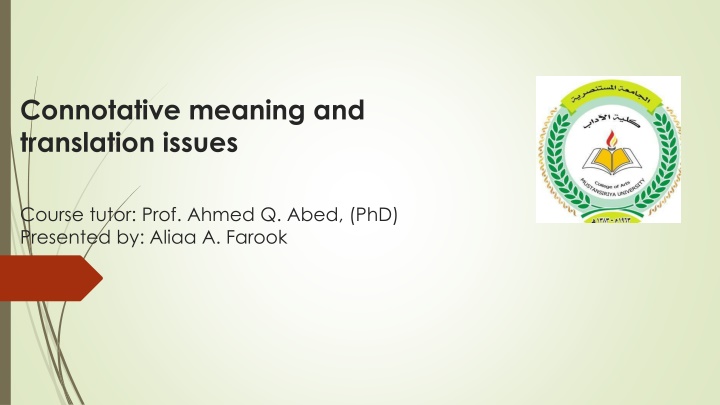
Connotative Meaning and Translation Issues in Language Studies
Explore the impact of connotative meaning on language translation, with a focus on attitudinal meanings and nuances in conveying messages accurately. Learn how context and cultural nuances play vital roles in effective translation.
Download Presentation

Please find below an Image/Link to download the presentation.
The content on the website is provided AS IS for your information and personal use only. It may not be sold, licensed, or shared on other websites without obtaining consent from the author. If you encounter any issues during the download, it is possible that the publisher has removed the file from their server.
You are allowed to download the files provided on this website for personal or commercial use, subject to the condition that they are used lawfully. All files are the property of their respective owners.
The content on the website is provided AS IS for your information and personal use only. It may not be sold, licensed, or shared on other websites without obtaining consent from the author.
E N D
Presentation Transcript
Connotative meaning and translation issues Course tutor: Prof. Ahmed Q. Abed, (PhD) Presented by: Aliaa A. Farook
An overview connotative is a meaning suggested or implied by the use of a particular word, beyond its literal (denotative) meaning. Connotation impacts how readers perceive the overall meaning of what a writer or speaker is trying to communicate. Depending on how a word has been used over time, or the context in which it is being used, the term may have a positive, negative or neutral connotation. A word's connotative meaning includes shades of meaning, such as emotions, associated with the term. connotative meanings are many and varied, and it is common for a single piece of text, or even a single expression, to combine more than one kind into a single overall effect
1-Attitudinal meaning Attitudinal meaning is that part of the overall meaning of an expression that consists of some widespread attitude to the referent. The expression does not merely denote the referent in a neutral way but also hints at some attitude to it. for instance, the police , the filth and the boys in blue are synonyms in terms of denotative content, but they have different overall meanings. The police The filth The boys in blue pejorative overtones Neutral expression affectionate ones
These attitudes to the police are not part of the denotative meaning of the expressions, but it is impossible to ignore them in responding to the expressions. It is therefore important not to overlook them when translating. Normally, words that have attitudinal meaning also have denotative meaning. It is relatively difficult to find examples of attitudinal meaning in Standard Arabic that are intrinsic features of the word itself. This is at least in part because of the formal nature of Standard Arabic. As can be seen from the example the boys in blue versus the police , there is typically a close relation between attitudinal meaning and informality. This does not mean, however, that attitudinal meaning is unimportant in translating Standard Arabic into English, as an attitudinal meaning can sometimes emerge from the context of usage of a word in an Arabic ST. In such cases, it is sometimes appropriate to use a word with a different denotative meaning in English. Consider the following: In short, military coups provide their perpetrators with the opportunity to move from military posts to political leadership. This is taken from a book that deals with the relationship between the military and political power in the Arab world and that is very critical of military involvement in Arab politics. Accordingly, leaders in this context acquires rather negative overtones. In the TT, the translator reflects this by using the word perpetrators . The negative aspect of perpetrators is part of its denotative meaning, not its connotative meaning: it is by definition not possible to perpetrate a good deed.
Consider the following from a poem by : .. Ah Beirut . . . my lady amongst millions of women In Arabic, female and woman (plural have clearly differentiated ) meanings; is a hyperonym of lady and women . Lady and woman are synonyms in English, the difference between them being that lady has overtones of respect. In the TT, however, the translator has used . Another example taken from an article on the subject that is very sympathetic to the Albanian side: ]. . .[ They have raided homes one by one Here, homes can be contrasted with its near-synonym houses . Houses is a neutral word in English, whereas home has warm emotional connotations.
2- Associative meaning Associative meaning is that part of the overall meaning of an expression that consists of expectations that are rightly or wrongly associated with the referent of the expression. The word nurse is a good example. Most people automatically associate nurse with the idea of female gender, as if nurse were synonymous with female who looks after the sick . This unconscious association is so widespread that the term male nurse has had to be coined to counteract its effect: he is a nurse still sounds semantically odd, even today. Consider in this respect the associations of Crusade in English, which continue to be positive (regardless of recent Western scholarly reassessments in this area), and contrast this with the strongly negative associations of in Arabic. Conversely, the word in Arabic traditionally has highly positive associations, but in English the cultural borrowing jihad is chiefly associated with organizations such as Islamic Jihad, which are widely regarded in the West as extremist and anti-democratic. (For the same reasons, the word has also acquired negative associations among some Arabic speakers.)
Differences between associative meaning and polysemy The word crusade is polysemous, having amongst its senses (1) A military expedition undertaken by the Christians of Europe in the 11th, 12th, and 13th centuries to recover the Holy Land from the Muslims, and by extension any war instigated and blessed by the Church for alleged religious ends, a holy war ; applied esp. to expeditions undertaken under papal sanction against infidels or heretics and (2) An aggressive movement or enterprise against some public evil, or some institution or class of persons considered as evil (definitions from Oxford English Dictionary Online). Sense 2 of crusade ( An aggressive movement or enterprise against some public evil [. . .] ) is not an associative meaning of sense 1. ( A military expedition undertaken by the Christians of Europe in the 11th, 12th, and 13th centuries to recover the Holy Land [. . .] ). Rather, this is a case of polysemy: crusade is polysemous, having amongst other senses senses 1 and 2 given here. And this called a reflected meaning.
Examples: a good example of associative meaning is provided by Ramadan in English (and in Arabic). Westerners who know something about Islam might regard Ramadan as a time of self-denial and fasting, which it is. However, in Muslim countries, Ramadan is also a time of celebration, in which children are allowed to stay up late, when there is a lot going on in the streets into the middle of the night, when families who have been separated come together again, etc. These associations are likely to be missed, even by an informed Western readership of a text in which Ramadan figures, unless they have some personal experience of the Middle East. given the relative cultural distance between the Arab world and the English speaking world, associative meanings are likely to be a problem. Consider the potential difficulty of translating into English; a denotative near-equivalent might be tea house , tea garden , coffee house or possibly cafe . However, in terms of the cultural status of the as the center of informal male social life, the nearest equivalent in British culture might be the pub. Given the Islamic prohibition on the drinking of alcohol, however, such a translation would in most cases be ruled out. another example of how associative meaning may motivate a shift in denotative meaning between the ST and the TT is provided by the following, which describes a young man tending his dying mother: . This is translated ( Brown 1996: 32) as: then pulling the covers over her frail body . Here, the translator has not translated by a TL term that is roughly synonymous with it, such as old or aged . ( Aged here is perhaps relatively acceptable, although it provides information that is already well known to the reader and therefore seems irrelevant in this context.
associative meanings that are linguistically determined. These can be seen in cases of what is sometimes termed imperfect synonymy. An example is the verbs vernietigen and vernielen. these two words appear to have referred to exactly the same range of situations, even in the writings of one and the same author. However, differences become apparent when the frequencies of different senses are compared, vernietigen being used typically in an abstract sense, vernielen typically referring to an act of physical destruction. vernietigen and vernielen here have the same denotative meanings that is, they cover the same range of referents and are thus synonyms . However, there is a tendency for vernietigen to refer to abstract destruction and vernielen to physical destruction. We may say that vernietigen has an associative meaning of abstract destruction , while vernielen has an associative meaning of physical destruction .
An example of linguistically motivated associative meaning difference in Classical Arabic is that between and ( Elewa 2004). These words both mean sin, wrong, offence , and both seem to have had the same range of meaning: anything that could be called an could also be called a and vice versa. They were thus synonyms (i.e. they had the same denotative meaning). On the basis of a survey of the usages of these two words in a corpus (group) of Classical Arabic texts, however, Elewa concludes that the two words tended to be associated with different types of activity. was typically used for sins that are personal or do not entail a punishment in this world (such as failing to perform obligatory acts of worship, or doing a bad deed whose effects are liable to have a bad effect on oneself, such as drinking or gambling). on the other hand, was typically used for sins that involve punishment in this world or the next, such as killing, theft or adultery.
3- Affective meaning Affective meaning is an emotive effect worked on the addressee by the choice of expression and that forms part of its overall meaning. The expression does not merely denote its referent but also hints at some attitude of the speaker or writer to the addressee. features of linguistic politeness, flattery, rudeness or insult are typical examples of expressions carrying affective meanings. Compare, for example, Silence please and Shut up , or and in Arabic. These expressions share the same core denotative meaning of Be quiet , but the speaker s implied attitude to the listener produces a different affective impact in each case: polite in the first, rude in the second. statements and questions, can have alternative forms identical in basic denotative meaning yet totally different in affective meaning. An example is I want the bog , which carries affective overtones of disrespect or at least extreme familiarity, versus I need to go to the lavatory , whose formality and politeness suggest respect for the addressee.
translators must be able to recognize affective meanings in the ST. But they must also be careful not to introduce unwanted affective meanings into the TT. To take an example from colloquial Arabic (Sudanese), a customer in a general store says accordance with the standard conventions in Arabic for requests that can be easily complied, no politeness formula is included here. It would of course be possible to translate this sentence into English as Give me a kilo of rice . However, this might sound rude, as the normal convention in English in shops is to use terms such as Please and Thank you (often repeatedly throughout the exchange). A safer option might be to cushion the TT by translating the ST as something like A kilo of rice, please , or May I have a kilo of rice, please? . Give me a kilo of rice . In Although it is words and phrases (in particular senses) that are formal or informal, formality and informality imply affective meaning. This is because they connote a relationship between the speaker/writer on the one hand and the listener/ reader on the other. In informal writing/speech, this connoted relationship is one of emotional closeness and normally also rough equality of status, at least in the context in which the utterance is made. In formal writing/speech, the relationship is one of emotional distance and normally also of non-equality of status.
Differences and similarities between attitudinal meaning and affective meaning The difference is that attitudinal meaning involves attitude to the referent (i.e. the person or thing referred to), whereas affective meaning involves attitude to the addressee (i.e. the person spoken to). Where the referent is also the addressee, affective meaning and attitudinal meaning will coincide. Both attitudinal meaning and affective meaning are emotional in nature (they convey how the speaker/writer feels about the referent or the addressee). Associative meaning, by contrast, has to do with a tendency to refer (e.g. the tendency of to refer to a sin that is personal or does not involve a punishment in this world or the tendency of to refer to a sin that does involve punishment in this world or the next). Associative meaning is thus focused on the referent. (very) informal (very) formal


















